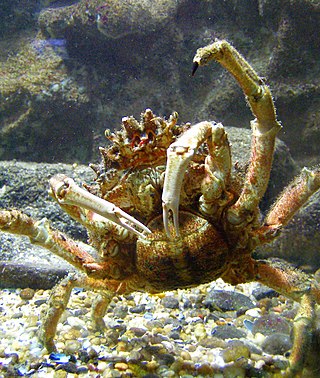
Maja is a genus of majid crabs erected by Jean-Baptiste Lamarck in 1801. It includes the following extant species:

Cancridae is a family of crabs. It comprises six extant genera, and ten exclusively fossil genera, in two subfamilies:

Xanthoidea is a superfamily of crabs, comprising seven families. Formerly, a number of other families were included in Xanthoidea, but many of these have since been removed to other superfamilies. These include Carpilioidea, Eriphioidea, Hexapodoidea, Pilumnoidea and Trapezioidea. Even in this reduced state, Xanthoidea remains one of the most species-rich superfamilies of crabs.
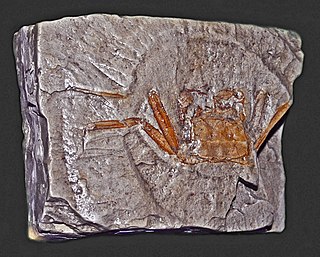
Retroplumidae is a family of heterotrematan crabs, placed in their own (monotypic) superfamily, Retroplumoidea.

Calappidae is a family of crabs containing 16 genera, of which 7 are only known as fossils:
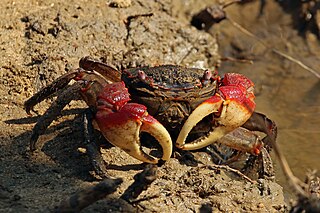
The Sesarmidae are a family of crabs, previously included in the Grapsidae by many authors. Several species, namely in Geosesarma, Metopaulias, and Sesarma, are true terrestrial crabs. They do not need to return to the sea even for breeding.

The Varunidae are a family of thoracotrematan crabs. The delimitation of this family, part of the taxonomically confusing Grapsoidea, is undergoing revision. For a long time, they were placed at the rank of subfamily in the Grapsidae, but they appear to be closest to Macropthalmus and the Mictyridae, which are usually placed in the Ocypodoidea. It may thus be better to merge the latter superfamily with the Grapsoidea, retaining the latter name as it is older.

Homolodromiidae is a family of crabs, the only family in the superfamily Homolodromioidea. In contrast to other crabs, including the closely related Homolidae, there is no strong linea homolica along which the exoskeleton breaks open during ecdysis. The family comprises two genera, Dicranodromia, which has 18 species, and Homolodromia, with five species.

Atelecyclidae is a family of crabs belonging to the superfamily Cancroidea, and currently contains eight genera of which two are extinct. However, the genera other than Atelecyclus and Pseudocorystes do not belong in the Cancroidea, and are to be removed from the family.
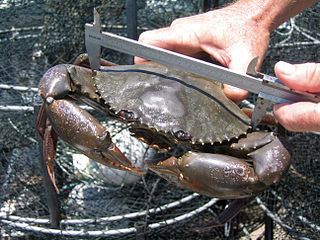
Scylla is a genus of swimming crabs, comprising four species, of which S. serrata is the most widespread. They are found across the Indo-West Pacific. The four species are:

Pilumnoidea is a superfamily of crabs, whose members were previously included in the Xanthoidea. The three families are unified by the free articulation of all the segments of the male crab's abdomen and by the form of the gonopods. The earliest fossils assigned to this group are of Eocene age.

Actumnus is a genus of crabs in the family Pilumnidae. Alongside the 28 extant species, it has a fossil record extending back into the Miocene.

Matutidae is a family of crabs, sometimes called moon crabs, adapted for swimming or digging. They differ from the swimming crabs of the family Portunidae in that all five pairs of legs are flattened, rather than just the last pair, as in Portunidae. Crabs in the Matutidae are aggressive predators.
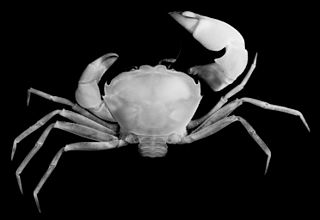
Pseudozioidea is a superfamily of crabs, formerly treated in the Eriphioidea, Carpilioidea, Xanthoidea, Pilumnoidea and Goneplacoidea. A number of fossils from the Eocene onwards are known from the family Pseudoziidae. Eleven genera are recognised in three families:

Palicoidea is a superfamily of crabs, comprising the two families Crossotonotidae and Palicidae. Together, they contain 13 genera, including two genera in the Palicidae known only from fossils. The two families were previously treated as two subfamilies in a Palicidae of wider circumscription.

Atergatis is a genus of crabs in the family Xanthidae, containing the following species:

Ethusidae is one of two extant families of crabs in the superfamily Dorippoidea. It contains four genera. Members of this family are found in marine environments at depths from 16m to 4,192m.

Galene is a genus of crabs belonging to the family Galenidae.

Corazzatocarcinus is an extinct genus of Cretaceous crabs. This genus include the species Corazzatocarcinus hadjoulae Roger 1946.

Necrocarcinidae is an extinct family of Late Jurassic and Cretaceous crabs. It comprises 40 species grouped in seven genera.



















